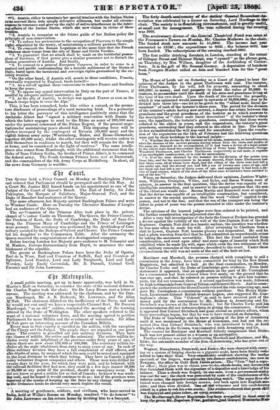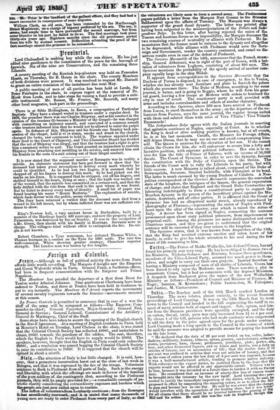l�r .rtrupnlin.
4 small,public meeting, got up in haste apparently, was held in St. Martin's Hall on Saturday, to consider the state of the national defences. Sir Charles Napier took the chair. Sir De Lacy Evans sent a letter of excuse. The meeting was addressed by the chairman, and by Sir Dun- Can Macdougal, Mr. A. B. Richards, Mr. Lawrence, and Sir Allan IrNab. The chairman dilated on the inefficiency of the Navy, and said he would not rest until we have a respectable Channel fleet. Sir Duncan Nacdougal, "as an old" soldier, reminded the meeting of the warning tittered by the Duke of Wellington. The other speakers referred to the went of a national volunteer force, and the meeting agreed to petition Parliament for more Militia and the enrolment of volunteers. Sir Allan M'Nab gave an interesting account of the Canadian Militia. Every man in that country is enrolled in the militia, with the exception oT the Clergy and the Judges. The people there are regarded as one great alrmy. The country is parcelled out into military divisions. They have two classes of militia, the active and the sedentary. The active militia in- cludes every male inhabitant of the province under forty years of age, of whom there are now about 170,000 or 180,000. The sedentary militia in- eindes all the male :nhabitants from forty to sixty years of age. In each of those military division they have a full complement of staff officers, and- altos depots of arms, by means of which the men could be armed and equipped in the local divisions to which they belong. They have in Canada a greet- many volunteer dragoon companies and others. Those men were drilled for twenty days in the year, for which they were paid, and he believed, with the railroad facilities they had now, they could in a few days muster 10,000 or 20,000 at any point of the province, should an emergency occur. He did not know so good a militia law as that of Canada ; he knew it was work ing well, and he-hoped it would continue-to do so ; but if the province were deprived of the means of keeping up the force by any change with respect teethe Ordnance lands he should very much deplore the result.
A meeting of gentlemen, soldiers, and civilians, who have served in India, held at Willis's Rooms on Monday, resolved "to do honour "•to Sir John .Lawrence on his return home by inviting him to a banquet.
The forty-fourth anniversary of the -Artists' General Benevolent As- sociation was celebrated by a dinner on Saturday, Lord Harding-e in the chair. The society is in flourishing Circumstances, and is greatly useful, at small cost for management. The stun collected during the evening was 5001.
The. anniversary dinner.of the ireicial. Theatrical Fund was eaten at the Freemason's Tavern on Monday, Mr. Charles Mathews in the chair. The funded stock now amounts to 11,0001. The income last year amounted -to 1.320/. ; the expenditnre to 860/. ; the balance-1601. has been funded. The subscriptions of the evening reached-5001.
The first public drinking fountain in London, standing at tbncorner of Gilispur Street and SkinnerStreet; tins "opened" as the pliraseffnes, on Thursday, by Mrs. Willson, daughter of the Archbishop of Canter- . bury. It is the.gift of Mx. S'amuel..Guraey. .A deputation of butchers from Newgate Market called on -him and thanked him for this "great boon."
The House of Lords sat on Saturday as a Court of Appeal to hear the opinions of the Judges in the great Thellusson will case. The testator, Peter Thellusson, by his will, left his property, amounting to about 600,0001. in money, and real .property to about the value of 30,0001. to trustees, to accumulate until the death of his sons and grandsons living at the time of his own death. Upon the death of the survivor the property, which it was estimated would amount to upwards of 30,000,0001., was to be divided into three lots—one lot to be given to the " eldest male lineal de- scendant" of each of the testators three sons. The period for the division of the testator's estate having now arrived, a dispute has arisen between the grandsons and the great graudsous..of the testator as to which answers to the description of " eldest male lineal descendant" of the testator's three sons, the appellants, the testator's grandsons, contending that those words referred to the eldest in years, and the respondents, the testator's great grandsons, contending that they referred to the eldest in line. The heirs- • at-law submitted that the will was void for uncertainty. Upon the conclu- sion of the arguments on the 14th of February last the following questions_ were put by theirlordships to the learned judges- " 1. Whether the devise by the testatorof his lands, tenements, or hereditament& after the decease of the several persons during whose lives the rents and profits of the same are directed to be accumulated (if it had been a devise of a legal estate to the eldest male lineal descendant then thing of Peter Isaac Thellusson, George Woodford Thellusson, and Charles Thellusson respectively in tail male, is capable of an intelligible construction, or is void for uncertainty. " 2. If at the time directed by the testator for the-division of the estate into three lots, and for the conveyance to be made thereof, Peter Isaac Thellusson had had three sons, all of whom were dead., and the eldest of the three sons had left a son under age, and the second son had left a son of twenty-one years of age, and the third son had left a son of thirty years of age, and supposing it had been a de- vise of legal estates, which of the sons of the three sons would have been entitled to one of the lots "t When, on Saturday, the Judges delivered their opinions, Justices Wight- man, Williams, Crompton, Willes, and Byles, and Baron Watson were of opinion, in answer to the-first question, that the devise was capable of an intelligible construction, and in answer to the second question that the son: of the eldest son would take. Barons Martin and Bramwell were of opinion that the devise was capable of an intelligible construction, but considered, in answer to the second question, that the word "eldest" applied to the person, and not to the line, and that the son of the youngest son being the- eldest in point of years was the person-intended to take under the testator's devise.
The opinions of the learnedjudges were then ordered to be printed, and the further consideration was adjourned sine die. After a very fall investigation of the facts the Court of Probate has granted a decree against the validity of the will of the late Captain Nott of the 83d Regiment. Captain Nott died ina lunatic aaylum, the question was whether he was sane when he made his will. After returning to Chatham from a visit to Lewes, Captain Nott became gloomy and despondent. He said he had a plain warning from God that he had committed an unpardonable crime by taking the sacrament unworthily. This fact the Court excluded from. consideration, and went upon other and surer signs of insanity which Nett exhibited when he made his will, signs which even the two witnesses of the will, military comrades of the testator, described to the court. Under these circumstances the will wasset aside at the suit of the heir-at-law.
, .
Mortimer and -Marshall, the persons. charged with conspiring to sell a commission in the Army, have been committed for trial by the Bow Street Magistrate, but admitted to bail. -At the final examination, on Monday, Sir Charles Yorke and the Duke olCarabridge gave evidence. From their statements it appeared, that an application en the part of Mr. Cuninglutm for a commission had been refused when first made, on the.ground that he, was over age, and.that he referred:to persons willing to give him testimo- nials, but did not transmit them. A second application was made, followed, by high testimonials. from :General Nivianond General Steele. Andin conse- quence the authorities atthellorse,Guards relaxed the rule respecting age, and, gave. Mr. Cuningham a commission without tnehase. One Henry Stein- bach, Lieutenant-Colonel British-Gems= Legion, also supported Mr. Cun- ingham's claim. This "Colonel" lie said to have received part of the money paid for the commission by. ,Mx. ,Beidson to Armstrong and Co.- Steinbach was known at the Horse Guards ; but Sir Charles Yorke said his, recommendation did not intluence,them‘ingiving the commission. Further it appeared that Colonel Steinbach had gone abroad on private affairs, when these proceedings began, but that he was to have returned on Saturday. • The Duke of Cambridge said.he knew• nothing of the firm of Armstrong until it was mentioned in. the House of Commons, and had not the re." molest idea that Colonel Steinbach, who was introduced to him at -Lord, Raglan's when in the Crimea, wateconneeted with Armstrong and Co. The counsel for Mortimer and Mandiall bitterly complained -that Stein-, back was not present either as a wibeese or ay. Accomplice. Further evidence was put in implicating liarshall.and Mortimer, and Mr., Eicke, the ostensible member of the nun ofArmstrong,:who has gone out,of the way.
Wagner, Humphreys, Bramwell, and Foster; the men charged with carry- ing on a system of forging checks on a gigantic scale, have been finally cone;_
witted to take their - Very.remicikablo .evidence showing the modus operandi of the forgers,: was-givets by twe-former.confederates, one nowin Newgate, the-other in Cold Bath Fields .prison. -The ":firm" had a regu- lar office ; their plan was to obtain pass-books, check-books, any documents that furnished them with the signature-of a depositor and a knowledge of his balance. Then a check was forgedi in one case, 'even a government 'tamp was east for use ; the check was presented-by some of.the confederatesaf the inferior order, the superior conspirators:keeping watch. The sums thus obi tained were changed into foreign monies, and back again into English mos nies ; and then were divided. One ,al-the witnesses and late confederates joined in a plan to rob his own uncle.. The evidence showed that great skill was displayed and yains taken, on every occasion,
The Marlborough Street Magistrate.- has been compelled to bind over to keep the peace Air. Napoleon Priee,narlemer,:euA General Weetbrok.e Nat- kin. --Mr. 'Price is the 'landlord of the gallant officer, and they had had a smart encounter in consequence of some disputes. William Clark, an old man, has been remanded by the Marlborough Street Magistrate, on a charge of bigamy preferred by his son. The son, it seems, had ample time to have prevented the second marriage, but from some blunder on his part he failed to do so. The first marriage took place thirty-six years ago. Eighteen months since the old gentleman parted from his wife by mutual consent. Difficulties attending the proof of the first marriage oaused the prisoner to be remanded.



























 Previous page
Previous page